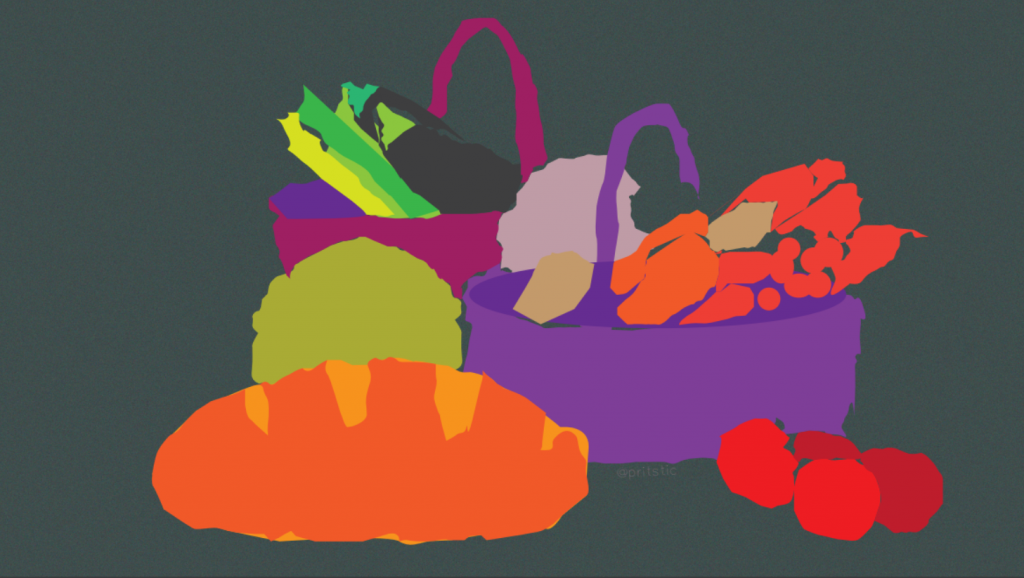Artwork by Prity Chatterjee
For most, university is the first time living away from home, and that means one thing: freedom. Freedom to get up at whatever time you fancy, freedom to put in as much or little effort into studying, and freedom to eat what you want, when you want. But, that also means it can be easy to slip into bad habits that are difficult to break out of. So, whether this is your first year at university or fourth year, it’s a chance for a fresh start. You might decide that you’re actually going to stick to the cleaning rota this year, or vow to never miss a 9am again. Or, it might be your eating habits that need to change. If so, we’ve got some tips to help you stick to those positive changes a long-term.
Tip 1: Do a food shop as soon as you move in
You might be tired if you’ve travelled a long way, but it’s worth going out and doing a food shop soon after you’ve moved in so you don’t put it off so much you never get round to it. If your parents are dropping you off, it’s a great way to squeeze a little extra time with them before they go too (and get them to pay for the shopping too). And, you’re more likely to make healthier food choices if your parents are there, so you can stock up on a shop that will keep you going for a couple of weeks and help you avoid freshers’ flu.

Tip 2: Fill up your cupboards with the essentials
If you’ve got the ingredients in the cupboard, that’s half the work done already. Ingredients that can be used in lots of different dishes are best, so you don’t end up with loads of foods taking up cupboard space that you rarely use. Tinned and dried foods are great options, because they’re often quite cheap and are unlikely to go bad before you have a chance to use them. Make sure you stock up on a good range of herbs and spices so you can make lots of flavour-filled dishes from scratch.
Store cupboard ingredients we’d recommend:
- Onions
- Garlic
- Oil
- Herbs/ spices
- Salt and pepper
- Soy sauce
- Honey
- Dried pasta
- Rice
- Noodles
- Tinned beans/ vegetables
- Chopped tomatoes
- Coconut milk

Tip 3: Get cooking from scratch
When there’s so much convenience food available, it’s easy to go through university without really cooking at all. Cooking from scratch is almost always cheaper, healthier and much tastier. If you didn’t cook much before university it can seem overwhelming, but you’ve only got to learn how to make a couple of simple recipes (like chilli con carne or pasta bake) and you’re set. These dishes are easy to change up so you don’t get stuck eating the same thing all the time. For example, swap out the meat for chickpeas or lentils in the chilli for a meat-free option, or add some roasted vegetables to the pasta bake to help you to reach your 5-a-day.
If it’s time you’re worried about, then why not invest in a slow cooker? Then, you can fill it up with ingredients before you go out for the day, and come back to a delicious, comforting dinner. Slow cookers are great for dishes like curries and soups, which are especially good for keeping you warm and nourished in the winter months. Learn how to cook a few simple meals at the start of term before the deadlines start, so you’ve got less stress when work stress builds.
Tip 4. Budget well (and stick to it!)
Budgeting might seem like a chore, but it will help you in the long run to make buying food much less of a stress. This way, you can make sure you’ve always got some money leftover at the end to treat yourself to a takeaway or drinks down the pub. If you can (and covid-permitting), pay for food with cash, because then it will be easier to process how much you’re spending.
To save money on your groceries, shop off-brand where you can, and choose the option that’s the lowest price per 100g/ per kg. Often, buying in bulk will save you even more money, but only do this if you’ve got the space to store it so nothing goes to waste. Go to local fruit and vegetable markets as this is often cheaper than supermarkets, and you’ll get the best of what’s in season too. Also, check out the world foods aisle in supermarkets. Often, staples such as chopped tomatoes and chickpeas are cheaper down there than in other sections, so have give it a try!

Tip 5. Eat three meals a day
This might not sound that ground-breaking, but making sure you’re eating three meals a day is a great way to keep a good routine. Skipping breakfast is very easy to do if you like a lie-in, but starting the day off with something filling will keep you from late-night snacking later on in the day. If you’ve got a morning lecture and would rather eat on the go, why not make yourself a smoothie the night before? Or, make sure you’ve got some cereal bars in so you can grab one of them on the way out. If you know you’re prone to eating whatever’s closest when you’re hungry, then try meal planning for a week so you’ve always got a delicious meal coming up.


